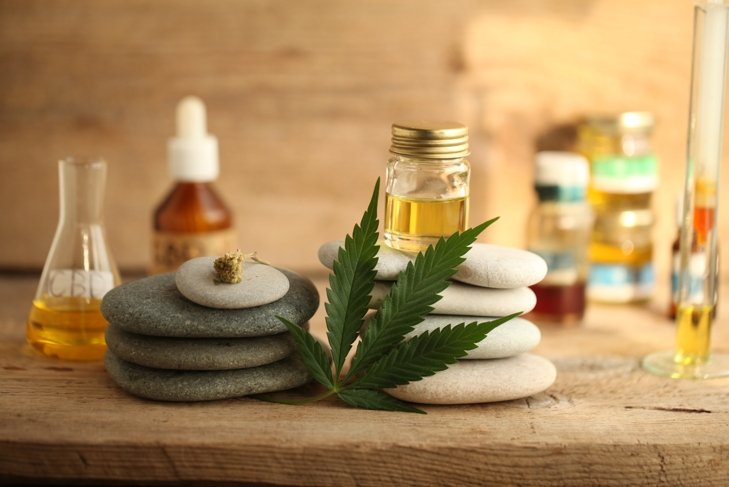
With the legalization of cannabis in Canada, the substance is springing up in everything from candies and cocktails to dog treats and candles. Add beauty and self-care products to the list.
Cannabis—or more accurately cannabidiol (CBD)—could well be the next “it” beauty ingredient, appearing in face masks, moisturizers, makeup, body wash, and more. In the US, many major (mainstream) cosmetics companies have launched CBD lines, an example of the increasing presence of cannabis compounds being used to make people feel more gorgeous and pampered.
A major cash infusion into cosmetics lines
Globally, business is booming. The CBD-infused cosmetics market is set to reach US$1.7 billion worldwide by 2025, according to Grand View Research, Inc.
What about in Canada?
Legally, in Canada, cosmetics can only contain cannabis derivatives that either do not meet the definition of cannabis in the Cannabis Act or have been exempted from the Cannabis Act through the Industrial Hemp Regulations.
Here’s where things get a little tricky. To meet that exemption, the ingredient derived from the Cannabis sativa plant—or “industrial hemp”—must not contain an isolated or concentrated phytocannabinoid or a synthetic duplicate of it.
CBD and tetrahydrocannabinol (or THC, the chemical that gives marijuana its psychoactive effects) are both phytocannabinoids; neither can be deliberately added to a beauty product. CBD is on the Prescription Drug List—meaning that to be legally sold on the Canadian market, any products with intentionally added CBD must follow the prescription pathway for regulatory approval.
Where does that leave cosmetics?
Cosmetics can contain phytocannabinoids that are naturally found in trace amounts in hemp. If a product contains THC (which is currently far less common than those with CBD), the THC concentration must be very low: less than 10 μg/g. (In other words, using a skin cream with CBD is not going to make you high.)
These products can be found at any retail store and in online shops.
Promising benefits
Where CBD beauty products seem to show the most promise to date are those intended for mild cases of skin conditions such as acne. CBD appears to be a safe and effective anti-acne agent on par with “triple” action pharmaceutical products—and doesn’t appear to have significant side effects.
CBD is said to have anti-inflammatory and antioxidant properties, which could help with psoriasis or eczema, as well in potentially diminishing the appearance of wrinkles.
Researchers speculate that the human body’s endocannabinoids—native receptors for cannabinoids—allow for any beneficial extracts to be instantly and fully absorbed, and therefore especially effective.
Mostly marketing, so far
Proponents of CBD-infused cosmetics promote other benefits that seem a little far-reaching, given the lack of sufficient rigorous studies to give the claims scientific heft. For example, some marketers claim CBD-infused mascara may make lashes longer, CBD lip gloss may help soften lips, and CBD skin cream might reduce the appearance of fine lines.
Research is just beginning into not only the efficacy and safety of such products but also the effects of long-term use, co-administration with other products, and impacts on vulnerable populations such as pregnant women.
Buyer beware
“CBD is the new hot topic in the cosmetics industry, but CBD is still very young,” says Saina Taidi, chair of the Society of Cosmetic Chemists, Ontario chapter, and global risk mitigation and agility senior manager for Estée Lauder companies.
“We are still studying it. I wouldn’t ever recommend substituting CBD-oil-based creams for whatever the industry has already studied. If you’re using vitamin C and E in a cream to get antioxidants, I wouldn’t recommend consumers remove that from their routine and use CBD instead. There are a lot of aspects of this molecule that have not been measured. I’m not against it at all; I’m saying we still need time to get to know this new guy on the block.”
Taidi urges people to do their due diligence and get as much credible information about a product first before buying, especially if ordering online. Products sold online are prone to being mislabelled. Research has found that some contained lower levels of CBD than what was stated on the bottle, some so low as to be inconsequential. Others from online sources could be unsafe.
“It does happen where products are being made in little labs and sold on websites that don’t get any sort of audit from Health Canada or the FDA [US],” Taidi says. “When you’re shopping on Instagram, you’ve got to make sure things are legit.
“There is no one size fits all,” Taidi says. “Just like any other topical system, it depends on your skin. If you have very sensitive skin with a lot of complications, you would go to your doctor to ask if you’re using the right product. It’s the same thing with CBD products. Be sure to check with your doctor first.” [END]
Other health benefits of cannabis and CBD
- CBD is often used to alleviate anxiety and insomnia (falling asleep and staying asleep).
- CBD may also help decrease pain due to arthritis and inhibit inflammatory and neuropathic pain.
- CBD helps reduce seizures suffered by children with specific epilepsy syndromes.
CBD beauty product glossary
Full-spectrum CBD refers to CBD extracts that contain all of the naturally occurring compounds found in cannabis plants, including flavonoids, terpenes, and other cannabinoids. They may contain THC (to a maximum of 0.3 percent).
Broad-spectrum CBD refers to CBD extracts that contain terpenes, flavonoids, and other cannabinoids—but THC is completely removed.
CBD isolate is the purest form of CBD extracts; they don’t contain any terpenes, flavonoids, or other cannabinoids, including THC.













